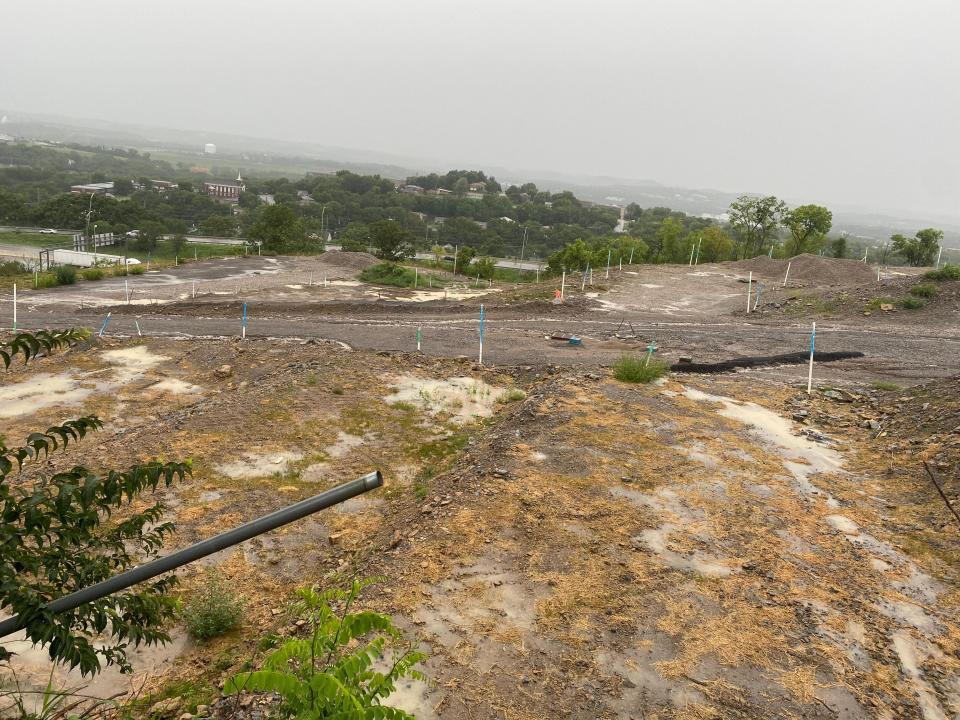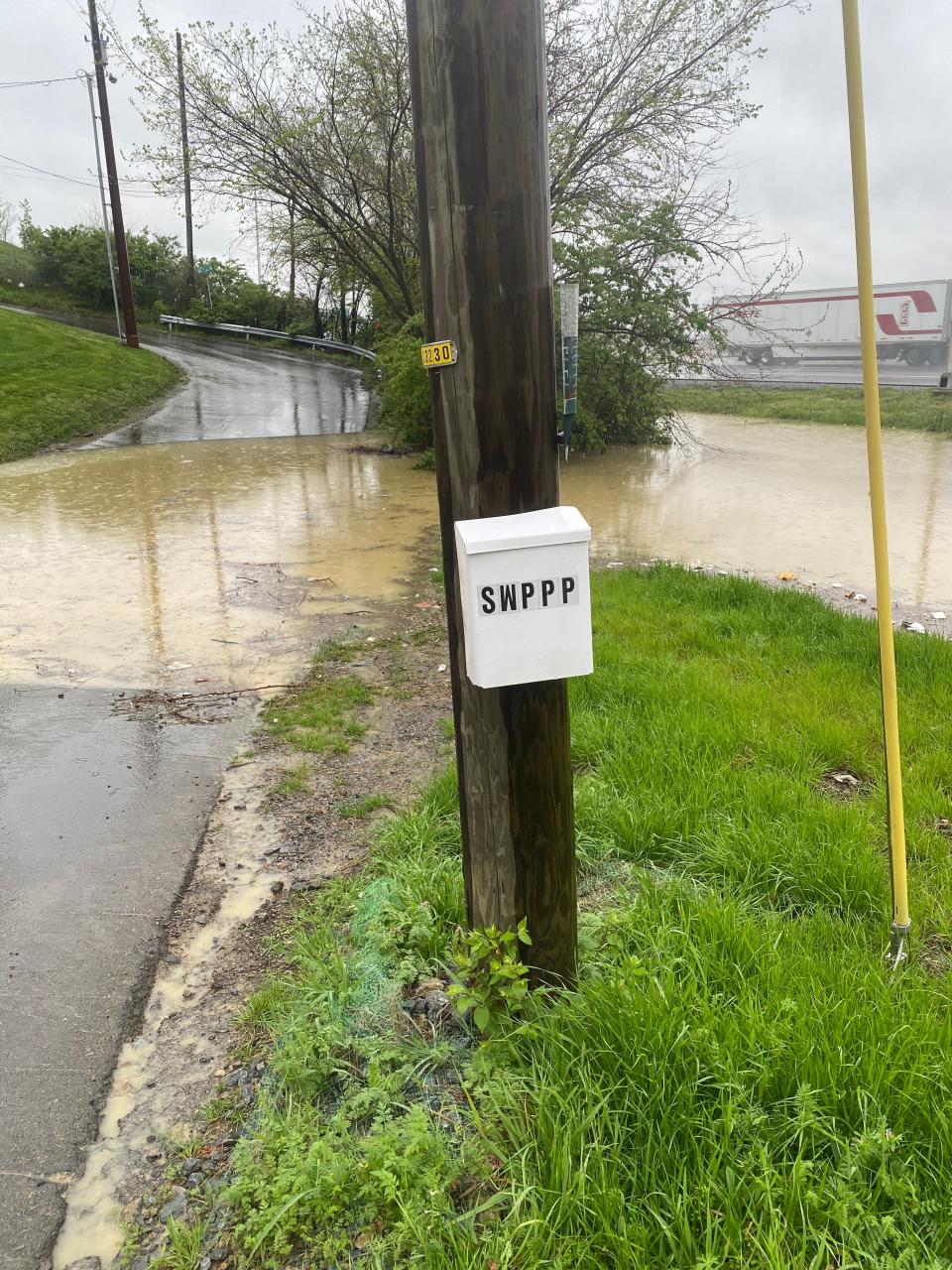Nashville developer sued over pollution; residents say that's just the tip of the iceberg
When Ricardo Argudin heard that the owner of the development across the street from him in Sylvan Heights was being sued, he responded quickly:
“It’s about time.”
At the time, he didn’t even know what the developer was being sued for. But he had enough issues living next to the development that it didn't surprise him.
The lawsuit was over an issue that is on its face rather mundane: stormwater management. The environmental group behind the lawsuit accuses developer Ardavan Afrakhteh of skirting environmental laws for the sake of profits, while muddy runoff from the site pollutes a tributary of the Cumberland River. The group says that it's a common problem across Nashville at construction sites.

“It’s death by a thousand cuts,” Barry Sulkin, environmental scientist for Tennessee Riverkeeper, said of pollution to the Cumberland River.
But area residents say the story of the Sky Nashville development is about more than environmental concerns, which they say are just the tip of the iceberg. They recounted stories of flooded streets, having their property torn down and trees ripped from their yards without much notice, of blasting at the site damaging their homes and being cursed at by Afrakhteh.
Afrakhteh said through his public relations firm that the lawsuit against him is unfounded and that his stormwater management system fully complies with the law.
And as for the local residents’ concerns, “that’s part of the push and pull of living in an urban area,” said Darden Copeland of the Calvert Street Group. It's a classic tension, Copeland said, between developers and residents who he said just want to get a house and close the door behind them.
But that doesn’t seem to explain all the bad blood — especially among those who previously supported the project.
“Developers serve a good purpose to provide people with homes and improvements to the neighborhood,” said Jonathan Rhodes, who said he was one of few residents who lives near the site who supported it. The problem is this specific developer, Rhodes said.
The history of Sky Nashville
In 2016, Afrakhteh, who Copeland said has more than 35 years of real estate experience in Nashville, acquired the Sylvan Summit property for $4.4 million.
Afrakhteh proposed an ambitious plan for a dense housing complex on the hill at the Interstate 40/440 interchange, which has a direct line of sight to downtown Nashville. His original proposal, designed by Malakouti Architects, was for 123 housing units on 4.75 acres of land at the intersection of 35th Avenue and Trevor Street. That number fluctuated in later proposals.
As frequently happens with large developments, people nearby opposed the plan. They wrote to the Planning Commission detailing their concerns about its potential effects on the area’s infrastructure, which they felt would strain the area’s narrow streets, change the neighborhood’s dynamic and result in an increase in rainwater runoff to the homes on the bottom of the hill.
“Already, when it rains, water pours down 36th (Avenue) in front of our home,” one resident wrote. “Removal of trees and the addition of that volume of roof water runoff is sure to cause more water to pour down the hills — we obviously do not have the infrastructure beneath this community to absorb that volume of water.”
The Richland Creek Watershed Alliance (RCWA) wrote with similar concerns about how the development would upset the natural flow of water to Richland Creek.

RCWA President Monette Rebecca wrote that development on the site threatened to “eliminate important environmental cues that dictate aquatic life’s behavior and life cycles. We don’t want warmer, dirtier waters sent to our streams. We want the cooler and cleaner groundwater flow to continue, as it has for ages here.”
So part of the deal was that Afrakhteh would have to come up with plans to widen streets, build sidewalks and manage stormwater runoff, among several other things. He did that, and the plan was approved.
Afrakhteh began clearing the land and tearing down the few houses that were on the property sometime between 2020 and 2022, historic images from Google Earth show. Afrakhteh recently has completely cut ties with the project, Copeland said.
In the time between, residents say there was no shortage of incidents.
Leaky roofs and property disputes: The pains of living beside the development
Lilly Lewin, who lives on Trevor Street, said that Afrakhteh has personally cursed her out, which she says is part of a bigger problem across the whole neighborhood.
“I just know that in my experience with him, he has not treated the neighbors fairly and with any kind of concern,” Lewin said.
Argudin and Lewin said that there were often given less than a day's notice before blasting on the site. Argudin said the third floor of his home began leaking as cracks began to develop shortly after blasting began, and the houses on the street were covered in dust. He also said that he complained to the city for weeks about how crews would begin blasting early in the morning.
Argudin also said residents were given little notice on things like water shutoffs and road closures.
Cody Pope, who lives on 35th Avenue, said that water runoff pools up at the bottom of the hill so badly since development began that cars can’t drive through it.
“It’s very frustrating,” he said.
Rhodes, who has lived in his home on Felicia Street for eight years, said that this March, Afrakhteh’s crew tore down the fence, retaining wall and crepe myrtle in his yard despite reassurances from Metro inspectors that they wouldn’t be torn down. The sidewalk was set, then ripped up, then set up again in what he believes was his yard.
Copeland said that all the land Afrakhteh took was within the city right of way.
“If it's in the right of way, it's the city's tree. And if the city says, ‘We've got to widen the street,’ then Ardavan’s going to widen the street,” Copeland said.
He added that Afrakhteh maintains everything he's done has been legal, even if there have been communication issues.
“I'm sure there's always room for improvement of communication," Copeland said.
Argudin said what he's experienced in Sylvan Heights has been far worse than his experience living next to developments in the Nations and the Gulch.
"It comes a point where living in Nashville, where we as residents ... are suffering over whatever the developers want to have happen," Argudin said. "Because nine times out of 10, if a developer wants something, that's going to happen."
Tennessee Riverkeeper’s lawsuit alleges Clean Water Act violations
The Tennessee Riverkeeper filed a lawsuit against Afrakhteh in July, accusing him of violating the Clean Water Act and conditions of permits associated with the construction activity.
Under the permit, Afrakhteh is allowed to discharge treated stormwater into Richland Creek. Tennessee Riverkeeper says that not only is the stormwater leaving the site untreated and filled with sediment, in violation of the Clean Water Act, it also flows into Philips Branch, a nearby tributary of the Cumberland River, not Richland Creek. That runoff contains pollutants that threaten water quality and damage the habitat for wildlife that live in or near the streams, according to Tennessee Riverkeeper.
Sulkin, the environmental scientist, said he tracked the flow of the muddy runoff for months. Each time it rained, he would head to the site to take pictures of the water — which he shared with The Tennessean and described as “chocolate” colored. He said he found it flowing underneath the interstate.
But Afrakhteh and Metro said that’s not true. John Honeysucker, liaison for Metro Waste Services, said that the pipe that leads to Philips Branch, which is property of the Tennessee Department of Transportation, is clogged, making it impossible that the runoff is reaching that creek.
In response, Sulkin, who previously served as chief of enforcement for the Tennessee Department of Environment and Conservation, said that the ground in the area is not suited to absorb that much water to make that story make sense.
Sulkin said nonprofits like Tennessee Riverkeeper file suits like this against developers and cities because water pollution issues are underenforced. He said in cities with a robust water department, state enforcement “tends to step aside and let that local program take the lead under the presumption that (they’ll) divide and conquer, but often it means that nobody does it.”
New developer wants to make situation better
Baird Graham, the Nashville builder who purchased the property from Afrakhteh last year, said he hopes to make some positive changes to the property.
He said in a text to The Tennessean that he has had “similar issues regarding (Afrakhteh’s) practices towards stormwater management.”
“We will be taking this over and getting things done properly,” Graham said. “I personally support the TRK for all the great things they do and we are going to do our part on keeping Richland Creek healthy. As for neighbors, we always try to be cordial with neighbors and work with them. Unfortunately not everyone is like that. I live in the neighborhood and grew up here. We want nothing but the best for our neighbors. We are out to make this a better neighborhood than what it was existing left there. Now that we are about to begin construction. I will personally be on site daily and in control.”
Some of the residents who live nearby said that their experiences with Graham have been better so far.
“He reassured me that this isn't the type of person he is,” Rhodes said of Graham. “He has been very kind and very concerned. So I'm quite impressed with his communication thus far.”
Evan Mealins is the justice reporter for The Tennessean. Contact him at emealins@gannett.com or follow him on Twitter @EvanMealins.
This article originally appeared on Nashville Tennessean: Sky Nashville lawsuit only tip of the iceberg, Sylvan Heights residents say

